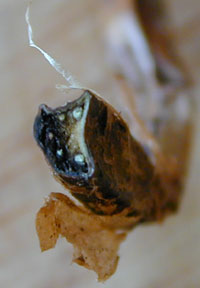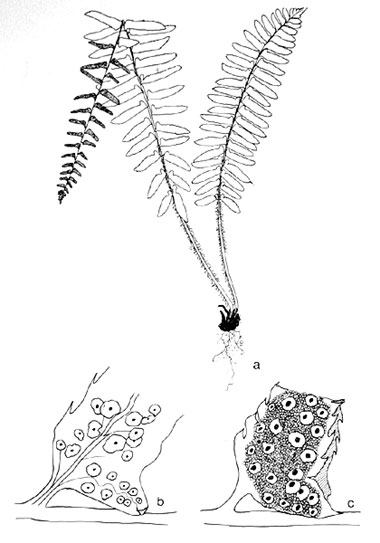| Polystichum acrostichoides | ||
Christmas fern | ||
|
Etymology
Acrostichoides means resembling the Acrostichum fern, a tropical genus, where the sori completely cover the undersurface.
Description
Rhizome: erect, stout, pale brown, subterranean, scaly.
Frond: 80 cm high by 12 cm wide, evergreen, somewhat dimorphic, the fertile pinnae (in upper part of frond) narrowed, blade/stipe ratio: 2:1 to 3:1. Stipe: grooved, green, densely scaly; scales light brown, diminishing in size upwards, vascular bundles: 5 in an arc. Blade: 1-pinnate, linear-lanceolate, base narrowed, glossy, microscales filiform, dense, on lower surface only. Pinnae: 20 to 30 pair, oblong to falcate, upper auricles well developed; margins entire to serrulate-spiny with teeth ascending; large natural variation; veins free, forked, anadromic. Sori: distinct, green at first, confluent later, completely covering lower surface of fertile pinnae (upper, reduced pinnae only), indusium: peltate, shriveling, centrally, sporangia: golden brown, maturity: early summer. Dimensionality: lower pinnae bend forward and down, out of the plane of the blade. Phenology: main flush late April-early May, occasional fronds later; spore matures June. Culture
Habitat: forest floor and shady, rocky slopes .
Distribution: eastern North America, Mexico.
Hardy to -35�C, USDA Zone 3.
Distinctive Characteristics
The sharp reduction in fertile pinna size (masked in the illustration due to the bent frond at the same point) is unique in the genus, as reflected here.
Synonyms
Nephrodium acrostichoides Michaux |
|
|

Polystichum acrostichoides. stipe base: five vascular bundles, 2 primary, three secondary, in a c-shape opening at the frond or stipe front. �Photo: Tom. |
